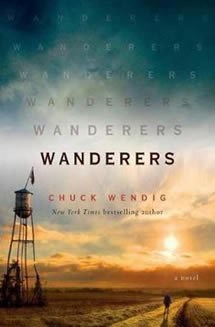Reviewed by Robert Goodman.
By Chuck Wendig, $47.99.
 It is starting to feel like we are in the middle of an apocalypse of books about the apocalypse. To the point where bookshops will have to start subcategorising them. Most popular of all, though, is the pandemic apocalypse, followed closely by the zombie apocalypse (they are closely related as the zombies are usually the result of some disease). In Wanderers, Chuck Wendig has put these two together, although he has flipped the script a little which, while refreshing, does not escape from the feeling that this is a whole lot more of the same.
It is starting to feel like we are in the middle of an apocalypse of books about the apocalypse. To the point where bookshops will have to start subcategorising them. Most popular of all, though, is the pandemic apocalypse, followed closely by the zombie apocalypse (they are closely related as the zombies are usually the result of some disease). In Wanderers, Chuck Wendig has put these two together, although he has flipped the script a little which, while refreshing, does not escape from the feeling that this is a whole lot more of the same.
When Wanderers opens, teenage Sharna watches her sister Nessie walk out the door and blankly down the road. She has become some form of zombie – glassy eyed, unresponsive and walking slowly but inexorably forward. Her skin has become toughened and she does not need to eat or drink. Nessie is soon joined by others and it turns out if you try and stop the Sleepwalkers (as they become known) with too much force they literally blow up. The first half of the book follows the sleepwalker phenomenon, as family members, police and the CDC join the growing caravan. These are fairly benign zombies – they slow moving and are non-violent – but it does not stop fear from spreading and people starting to make political capital out of the growing mystery.
While there is a large cast of characters, the key role is Benji, a formerly disgraced CDC operative who is brought in to work with an artificial intelligence called Black Swan. Black Swan uses big data to try and help the CDC pinpoint outbreaks and soon it turns out that the small group of sleepwalkers trudging across the American Midwest are the least of the world’s worries.
All of the apocalyptic and post-apocalyptic scenarios have been done multiple times. The thing that sets one apart from the other is how it uses the scenario to shine a broader light on the human condition. Books like Station Eleven (pandemic) or Severance (pandemic and zombies, sort of) did this really effectively. The target of Wanderers, if there is one, is to expose the ultra right-wing, white supremacist American heartland. The book’s antagonist Ozark Stover is a gun loving, drug dealing, politically connected thug who supports a Trump-like presidential candidate called Creel and is at the forefront of an organised and national militia that takes advantage of the chaos when it begins. He takes plenty of opportunities, particularly in relation to naïve and manipulated man-of-god Matthew, to show just how evil he (and by association the whole of this movement) is. If Stover had a moustache he would twirl it and his offsides are the usual group of redneck goons from central casting. There is probably justification for this focus given recent events in the United States involving guns, but it is a very American issue and after a while feels like more American navel gazing.
Wendig does have a knack for quickly establishing characters that feel a little more than two dimensional. But given the plot, they all quickly fall into their defined archtypes – the plucky teenager, the intuitive CDC boffin, the egotistical rockstar who finds he might have a heart, even the can-it-be-trusted Artificial Intelligence. And there are some clever, if reasonably predictable, twists right up to the last few pages. But in the end this is more of the apocalyptic same. This will keep those who can not get enough of pandemic-driven apocalyptic tales (and the appetite seems bottomless at the moment) going. It will absolutely confirm the very real fears of anyone who is even remotely following politics in the United States (and it is hard not to). Others may want to find something a little meatier and a little more original.
This and over 400 more reviews can be found on Pile By the Bed.











